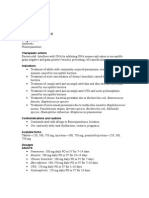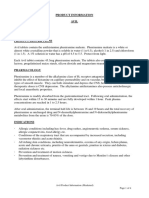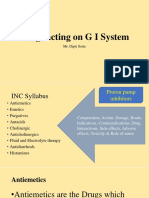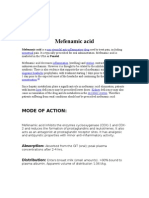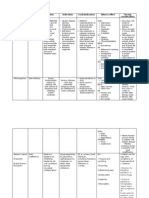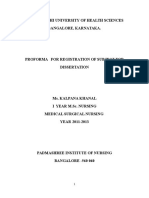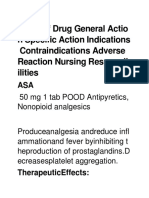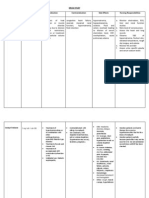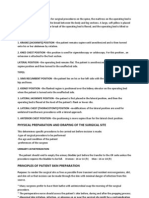Name of Drug General Action Specific Action Indications Contraindications Adverse Reaction Nursing Responsibilities
Name of Drug General Action Specific Action Indications Contraindications Adverse Reaction Nursing Responsibilities
Uploaded by
Nicole SooCopyright:
Available Formats
Name of Drug General Action Specific Action Indications Contraindications Adverse Reaction Nursing Responsibilities
Name of Drug General Action Specific Action Indications Contraindications Adverse Reaction Nursing Responsibilities
Uploaded by
Nicole SooOriginal Description:
Original Title
Copyright
Available Formats
Share this document
Did you find this document useful?
Is this content inappropriate?
Copyright:
Available Formats
Name of Drug General Action Specific Action Indications Contraindications Adverse Reaction Nursing Responsibilities
Name of Drug General Action Specific Action Indications Contraindications Adverse Reaction Nursing Responsibilities
Uploaded by
Nicole SooCopyright:
Available Formats
Name of Drug
ASA 50 mg 1 tab PO OD
General Action
Antipyretics, Non opioid analgesics
Specific Action
Produce analgesia and reduce inflammation and fever by inhibiting the production of prostaglandins. Decreases platelet aggregation. Therapeutic Effects: Analgesia. Reduction of inflammation. Reduction of fever. Decreased incidence of transient ischemic attacks and MI.
Indications
Inflammatory disorders including: Rheumatoid arthritis, Osteoarthritis. Mild to moderate pain. Fever. Prophylaxis of transient ischemic attacks and MI.
Contraindications
Contraindicated in: Hypersensitivity to aspirin, tartrazine (FDC yellow dye #5), or other salicylates Cross-sensitivity with other NSAIDs may exist (less with non-aspirin salicylates) Bleeding disorders or thrombocytopenia (more important with aspirin) Children or adolescents with viral infections (may increase the risk of Reye's syndrome) Use Cautiously in: History of GI bleeding or ulcer disease Chronic alcohol use/abuse Severe renal disease (magnesium toxicity may occur with magnesium salicylate) Severe hepatic disease
Adverse Reaction
EENT: tinnitus. GI: GI bleeding, Dyspepsia, Epigastric Distress, Nausea, Abdominal Pain, Anorexia, Hepatotoxicity, Vomiting. Hemat: Anemia, Hemolysis, Increased Bleeding Time. Misc: Allergic Reactions Including Anaphylaxis And Laryngeal Edema.
Nursing Responsibilities
Assessment Pain: Assess pain and limitation of movement; note type, location, and intensity before and at the peak (see Time/Action Profile) after administration. Fever: Assess fever and note associated signs (diaphoresis, tachycardia, malaise, chills). Aspirin: Prolongs bleeding time for 4-7 days and, in large doses, may cause prolonged prothrombin time. Monitor hematocrit periodically in prolonged high-dose therapy to assess for GI blood loss. . Toxicity and Overdose: Monitor patient for the onset of tinnitus, headache, hyperventilation, agitation, mental confusion, lethargy, diarrhea, and sweating. If these symptoms appear, withhold medication and notify physician or other health care professional immediately. Implementation Use lowest effective dose for shortest period of time. PO: Administer after meals or with food or an antacid to minimize gastric irritation. Food slows but does not alter the total amount absorbed. Do not crush or chew enteric-coated tablets Do not take antacids within 1-2 hr of enteric-coated tablets. Patient Teachings Instruct patient to take salicylates with a full glass of water and to remain in an upright position for 15-30 min after administration. Advise patient to report tinnitus; unusual bleeding of gums; bruising; black, tarry stools; or fever lasting longer than 3 days.
You might also like
- NCP CopdDocument14 pagesNCP CopdJanine ClaudeNo ratings yet
- Anatomy and Physiology of The BreastDocument42 pagesAnatomy and Physiology of The BreastNicole SooNo ratings yet
- Propranolol 1 PresentationDocument17 pagesPropranolol 1 Presentationapi-284092317100% (1)
- Haloperidol Drug StudyDocument3 pagesHaloperidol Drug StudyAysaaa DCNo ratings yet
- Diarrhea Is Derived From Greek Word, Meaning 'Flowing Through'. It Is The Second Leading Cause of Death in Children Under 5 Years of AgeDocument12 pagesDiarrhea Is Derived From Greek Word, Meaning 'Flowing Through'. It Is The Second Leading Cause of Death in Children Under 5 Years of AgefitahsinghNo ratings yet
- Case Presentation: Alcoholic GastritisDocument18 pagesCase Presentation: Alcoholic Gastritisstancy thomas100% (1)
- Drug StudyDocument8 pagesDrug StudyRizzi DeveraNo ratings yet
- Case Presentation On Ischemic Cardiomyopathy & Ccf-1-1Document18 pagesCase Presentation On Ischemic Cardiomyopathy & Ccf-1-1Maliha aliNo ratings yet
- Billroth's Procedure OriginalDocument38 pagesBillroth's Procedure OriginalDaf Zamar100% (1)
- Nursing Care For MeaslesDocument5 pagesNursing Care For MeaslesChristian Eduard de DiosNo ratings yet
- LevofloxacinDocument3 pagesLevofloxacinapi-3797941100% (2)
- Product Information Avil Product NamesDocument4 pagesProduct Information Avil Product Namesindyanexpress100% (1)
- Preoperative Skin PreparationDocument16 pagesPreoperative Skin PreparationSyahri DzikriNo ratings yet
- Drugs Acting On G I System: Mr. Dipti SorteDocument65 pagesDrugs Acting On G I System: Mr. Dipti Sortesandeepv08No ratings yet
- Therap Case 3Document18 pagesTherap Case 3Safoora RafeeqNo ratings yet
- PREGABALINDocument5 pagesPREGABALINJojenelle R. TepaitNo ratings yet
- Nursing Care Plan: Subjective: During 8 Hours Nursing Management: (5) After 8 HoursDocument4 pagesNursing Care Plan: Subjective: During 8 Hours Nursing Management: (5) After 8 HoursRawan KhateebNo ratings yet
- Common Side Effects of Oxytocin Include:: CNS: Maternal: COMADocument3 pagesCommon Side Effects of Oxytocin Include:: CNS: Maternal: COMAann camposNo ratings yet
- PermethrinDocument3 pagesPermethrinaficoNo ratings yet
- Mefenamic AcidDocument3 pagesMefenamic AcidVaibhav Mehta100% (1)
- Physical ExaminationDocument5 pagesPhysical Examinationjosna jesmonNo ratings yet
- Rani Ti Dine Tramadol Ketorolac in Paracetamol Drug StudyDocument10 pagesRani Ti Dine Tramadol Ketorolac in Paracetamol Drug StudyIv'z TandocNo ratings yet
- Drug StudyDocument4 pagesDrug StudyCharlayne AnneNo ratings yet
- To Know The Diagnostic ExamDocument23 pagesTo Know The Diagnostic ExamKaren Ai KonnoNo ratings yet
- Kardex, Drug Study and CheckDocument12 pagesKardex, Drug Study and CheckJemina Rafanan RacadioNo ratings yet
- Oxygen Terapi Dan PrinsipelDocument16 pagesOxygen Terapi Dan PrinsipelAmrita KaurNo ratings yet
- Health EducationDocument5 pagesHealth EducationMichellin Lara VergaraNo ratings yet
- Ranitidine, ParacetamolDocument3 pagesRanitidine, ParacetamoltaekadoNo ratings yet
- Nursing Care PlanDocument8 pagesNursing Care PlanKing RamosNo ratings yet
- Care of Casts and Splints - OrthoInfo - AAOSDocument2 pagesCare of Casts and Splints - OrthoInfo - AAOSSAIFUL ISLAM100% (1)
- Table 3. Treatment Regimens: F. Treatment Regimens by Category - The Following Abbreviations MeanDocument3 pagesTable 3. Treatment Regimens: F. Treatment Regimens by Category - The Following Abbreviations MeanKevin Leo Lucero AragonesNo ratings yet
- Case Study On Peptic Ulcer DiseaseDocument29 pagesCase Study On Peptic Ulcer DiseaseREYJAN APOLONIONo ratings yet
- OMEPRAZOLEDocument5 pagesOMEPRAZOLEAngela QuiñonesNo ratings yet
- Thalassemia Nursing Diagnosis and CareDocument1 pageThalassemia Nursing Diagnosis and CareHannah Clarisse Monge IgniNo ratings yet
- Musculoskeletal DrugsDocument29 pagesMusculoskeletal DrugsjanulNo ratings yet
- ClarithromycinDocument3 pagesClarithromycinJoshua GonzalesNo ratings yet
- Drug Study FinalDocument3 pagesDrug Study FinalJazel OpinionNo ratings yet
- TUBERCULOSISDocument16 pagesTUBERCULOSISPankaj MandalNo ratings yet
- PhynetoinDocument3 pagesPhynetoinRoseben SomidoNo ratings yet
- Drug StudyDocument21 pagesDrug StudyShyla Garnace JavillonarNo ratings yet
- Nursing Care PlanDocument8 pagesNursing Care PlanVincent QuitorianoNo ratings yet
- RisperidoneDocument3 pagesRisperidoneapi-3797941No ratings yet
- CASE STUDY TablesDocument9 pagesCASE STUDY TablesMicah MagallanoNo ratings yet
- Case Study Icu Sem 6Document30 pagesCase Study Icu Sem 6BM2-0619 Mohd Khairul Naaim Bin PenchariNo ratings yet
- Drug Study: Brokenshire CollegeDocument2 pagesDrug Study: Brokenshire CollegeJai GoNo ratings yet
- EPOPROSTENOLDocument6 pagesEPOPROSTENOLMavy CantonNo ratings yet
- Drug Study HaldolDocument2 pagesDrug Study HaldolGracia EvangelistaNo ratings yet
- PHEOCHROMOCYTOMADocument25 pagesPHEOCHROMOCYTOMAKristian Dave Diva100% (1)
- CeftriaxoneDocument1 pageCeftriaxoneleroux2890100% (2)
- Presentation of Nephrotic Syndrome ICKADocument16 pagesPresentation of Nephrotic Syndrome ICKABagas NovandyNo ratings yet
- 05 N293 33108Document23 pages05 N293 33108Arjay G ParaniNo ratings yet
- Nursing Care PlanDocument3 pagesNursing Care PlanCrystelle MonaresNo ratings yet
- Health Teaching of Patients With Tuberculosis TreatmentDocument34 pagesHealth Teaching of Patients With Tuberculosis TreatmentFarhanaRahimNo ratings yet
- Oral Hygiene Word FileDocument13 pagesOral Hygiene Word FileManoj DongarwarNo ratings yet
- 14 3 Performance Checklist - Medical AsepsisDocument2 pages14 3 Performance Checklist - Medical Asepsistwy113100% (2)
- General Survey AssessmentDocument56 pagesGeneral Survey Assessmentdanny_ng080% (1)
- Ventricular Septal Defect, A Simple Guide To The Condition, Treatment And Related ConditionsFrom EverandVentricular Septal Defect, A Simple Guide To The Condition, Treatment And Related ConditionsNo ratings yet
- The politics of hunger: Protest, poverty and policy in England, <i>c.</i> 1750–<i>c.</i> 1840From EverandThe politics of hunger: Protest, poverty and policy in England, <i>c.</i> 1750–<i>c.</i> 1840No ratings yet
- Name of Drug General Actio N Specific Action Indications Contraindications Adverse Reaction Nursing Responsib IlitiesDocument8 pagesName of Drug General Actio N Specific Action Indications Contraindications Adverse Reaction Nursing Responsib IlitiesJade ParkNo ratings yet
- C C C Vertigo,: Electrolyte and Water Balance AgentDocument12 pagesC C C Vertigo,: Electrolyte and Water Balance AgentEarl Tony TrinidadNo ratings yet
- Drug Study Generic Name/ Trade Name Dosage/ Frequency Indication Contraindication Side Effects Nursing ResponsibilitiesDocument8 pagesDrug Study Generic Name/ Trade Name Dosage/ Frequency Indication Contraindication Side Effects Nursing ResponsibilitiesTrojangBaboyNo ratings yet
- Name of Drug General Action Specific Action Indications Contraindications Adverse Reaction Nursing ResponsibilitiesDocument1 pageName of Drug General Action Specific Action Indications Contraindications Adverse Reaction Nursing ResponsibilitiesNicole SooNo ratings yet
- Clopidogrel Drug StudyDocument1 pageClopidogrel Drug StudyNicole Soo90% (10)
- RetractorsDocument18 pagesRetractorsNicole SooNo ratings yet
- ORT (Positioning, Prepping and Draping The Patient)Document7 pagesORT (Positioning, Prepping and Draping The Patient)Nicole Soo100% (1)
- Specialized Surgical EquipmentDocument73 pagesSpecialized Surgical EquipmentNicole Soo67% (3)
- Surgical InstrumentationDocument93 pagesSurgical InstrumentationNicole SooNo ratings yet
- Dopamine Drug StudyDocument3 pagesDopamine Drug StudyNicole Soo78% (9)










